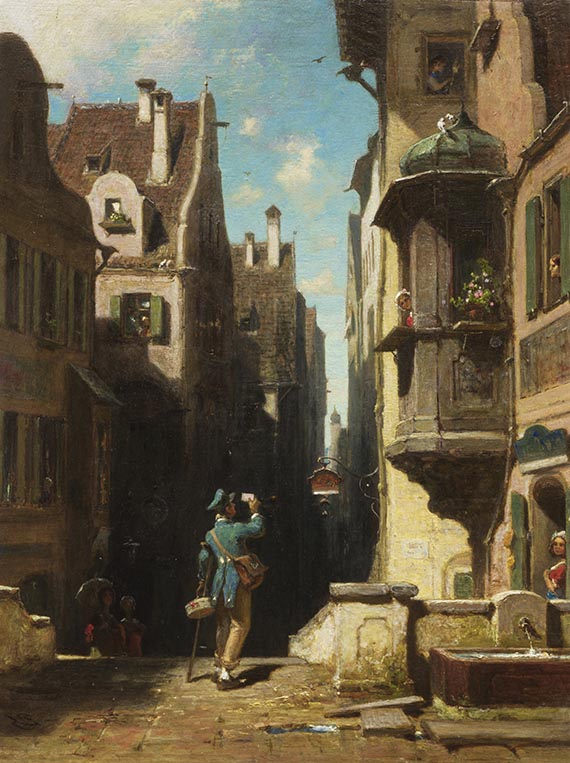Dictionary


Biedermeier / Empire
The term "Biedermeier" goes back to Ludwig Eichrodt and Adolf Kussmaul, who published "Fliegende Blätter" (Flying Leaflets) in Munich between 1855 and 1857, which contained satiric poems written under the pseudonym of the fictional square "Gottlieb Biedermaier". At first, the name had a rather negative connotation, because of its petty bourgeois origin, but as of 1900 it referred to the "Vormärz" (pre-March period) from between 1818 and 1848, that led up to the revolution in March 1848. It was a period of a bourgeois way of life, coined by modesty, frugality and certain internalized moral ideas.
The fine arts clearly indicate the new values. Instead of the pompous Empire style, the bourgeois home decor was now dominated by more functionality, simple forms, a better workmanship and more precious materials. Blossoms and small pillars set decent and decorative accents on light wooden surfaces. This tranquility is also reflected in painting, that turned away from romantic and lyrical tendencies, towards a kind of new Realism that seeks to capture even the smallest detail. Most pictures were made in a small format and were intended for domestic use. Accordingly, they often show scenes from everyday life or humorous or sentimental genre scenes. Carl Spitzweg (1808-85) is regarded as the most acknowledged Biedermeier painter, whose touching, often exaggerated and caricaturing pictures show a great love for the detail, making him a razor-sharp observer of his times. His most famous work is "Arme Poet" (Poor Poet) from 1839.
The authentically executed painting gives an impression of the then dominating tastes in fashion: Ladies wore roomy skirts and a high, tight corseted waistline. Ladies fashion may have been a little more frisky, men's clothing consisted of Pantaloons, frock coats, waistcoat and shirt with the typical choker collar that was also called "Vatermörder" (Patricide).
Along with Spitzweg, other Biedermeier artists are Eduard Gaertner, Johann Peter Hasenclever, Georg Friedrich Kersting, Franz Krüger, Ferdinand Georg Waldmüller and Xaver Winterhalter.
The term "Biedermeier" goes back to Ludwig Eichrodt and Adolf Kussmaul, who published "Fliegende Blätter" (Flying Leaflets) in Munich between 1855 and 1857, which contained satiric poems written under the pseudonym of the fictional square "Gottlieb Biedermaier". At first, the name had a rather negative connotation, because of its petty bourgeois origin, but as of 1900 it referred to the "Vormärz" (pre-March period) from between 1818 and 1848, that led up to the revolution in March 1848. It was a period of a bourgeois way of life, coined by modesty, frugality and certain internalized moral ideas.
The fine arts clearly indicate the new values. Instead of the pompous Empire style, the bourgeois home decor was now dominated by more functionality, simple forms, a better workmanship and more precious materials. Blossoms and small pillars set decent and decorative accents on light wooden surfaces. This tranquility is also reflected in painting, that turned away from romantic and lyrical tendencies, towards a kind of new Realism that seeks to capture even the smallest detail. Most pictures were made in a small format and were intended for domestic use. Accordingly, they often show scenes from everyday life or humorous or sentimental genre scenes. Carl Spitzweg (1808-85) is regarded as the most acknowledged Biedermeier painter, whose touching, often exaggerated and caricaturing pictures show a great love for the detail, making him a razor-sharp observer of his times. His most famous work is "Arme Poet" (Poor Poet) from 1839.
The authentically executed painting gives an impression of the then dominating tastes in fashion: Ladies wore roomy skirts and a high, tight corseted waistline. Ladies fashion may have been a little more frisky, men's clothing consisted of Pantaloons, frock coats, waistcoat and shirt with the typical choker collar that was also called "Vatermörder" (Patricide).
Along with Spitzweg, other Biedermeier artists are Eduard Gaertner, Johann Peter Hasenclever, Georg Friedrich Kersting, Franz Krüger, Ferdinand Georg Waldmüller and Xaver Winterhalter.
Offers
Headquarters
Joseph-Wild-Str. 18
81829 Munich
Phone: +49 89 55 244-0
Fax: +49 89 55 244-177
info@kettererkunst.de
Louisa von Saucken / Undine Schleifer
Holstenwall 5
20355 Hamburg
Phone: +49 40 37 49 61-0
Fax: +49 40 37 49 61-66
infohamburg@kettererkunst.de
Dr. Simone Wiechers / Nane Schlage
Fasanenstr. 70
10719 Berlin
Phone: +49 30 88 67 53-63
Fax: +49 30 88 67 56-43
infoberlin@kettererkunst.de
Cordula Lichtenberg
Gertrudenstraße 24-28
50667 Cologne
Phone: +49 221 510 908-15
infokoeln@kettererkunst.de
Hessen
Rhineland-Palatinate
Miriam Heß
Phone: +49 62 21 58 80-038
Fax: +49 62 21 58 80-595
infoheidelberg@kettererkunst.de
We will inform you in time.




